|






Click the flag
Meet our special
U.S. Publishers
|
ADD/ADHD Resources for Parents
Back
to ADD & ADHD Booklists
Featured
Books in this Category / Main Booklist

Featured
Books & Videos
|
The ADD/ADHD Checklist:
a Practical Reference for Parents and Teachers, 2nd Edition.
Sandra Rief, $19.99
Presented in a concise, easy-to-read checklist format,
The ADD/ADHD Checklist is packed with practical advice and information
on a wide range of topics, including what we do and don't know about
ADHD, probable causes, critical elements for school success, the
most commonly prescribed medications, what children with ADHD need
at home, effective behavioral strategies, how to help kids stay
organized, and advocating for an ADHD child. |
|
ADD/ADHD
Drug Free: Natural Alternatives and Practical Exercises to Help Your
Child Focus. Frank Jacobelli & L.A. Watson, $18.95 Featuring enjoyable, practical activities
that teach children how to improve behavior and improve brain function.
When medications are not the answer — or when they are not enough
— this book will help parents, teachers and counselors to help children
become more successful at school and in everyday activities and
relationships. |
|
The ADHD and Autism Nutritional Supplement Handbook. Dana
Goodbout Laake & Pamela Compart, $24.99
Many children diagnosed with ADHD or autism have
nutritional or metabolic inefficiencies. This detailed and practical book will
help you find out if your child is one of those suffering from this condition,
and learn how you can drastically improve your child’s symptoms and
wellbeing. Doctor-nutritionist team Pamela Compart, M.D. and Dana Laake,
R.D.H., M.S., L.D.N., reveal how to properly and safely implement supplements
and dietary changes. |
Back to top
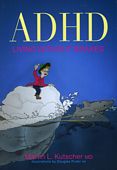
|
ADHD: Living Without Brakes. Martin
Kutscher, $22.95
Author Martin Kutscher, a pediatric neurologist,
describes the spectrum of ADHD, the concurrent symptoms, and common
difficulties that parents face. The book focuses on solutions, based
around four rules: keeping it positive, keeping it calm, keeping
it organized and keep doing rules one to three. Realistic and optimistic,
this book is the ideal source of information and advice for parents
and professionals who are trying to keep up with children who are
living without brakes.
|
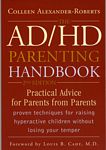
|
AD/HD Parenting
Handbook: Practical Advice for Parents from Parents, 2nd Edition.
Colleen Alexander-Roberts, $20.95
A compilation of practical advice and
tips for handling daily activities that often prove problematic
for ADHD children, such as getting ready for school, going to bed,
performing chores, completing homework, and playing with other children.
This revised and updated edition offers proven techniques for raising
hyperactive kids without losing your cool. |
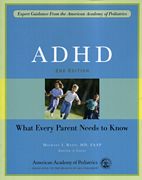
|
ADHD: What Every Parent Needs to Know, 2nd Edition. Michael Reiff, $18.95
ADHD: What Every Parent Needs to Know is a balanced
guide to help you and your child meet the many challenges of ADHD.
Written in clear, accessible language, this book includes the latest
information on diagnosis, advocacy, and medications as well as age-appropriate
guidance from preschool through adolescence. |
Back to top
|
The Adolescent and
Adult Neuro-diversity Handbook: Asperger Syndrome, ADHD, Dyslexia,
Dyspraxia and Related Conditions. Sarah Hendrickx, $24.95
The Adolescent and Adult Neuro-diversity Handbook is a handy first-reference point guide to the full range of
developmental conditions as they affect adolescents and adults.
Each chapter focuses on a different condition, describing its history,
causes and characteristics, its implications for the individual,
diagnosis and assessment, treatments and approaches, and strategies
for providing support and self-support. A wide range of conditions
are covered, including Autistic Spectrum Disorders, Dyslexia, Dyspraxia,
ADHD, OCD, Tourette's and Anxiety Disorders. |
|
All About ADHD: a Family Resource for Helping Your
Child Succeed with ADHD, 3rd Edition. Thomas Phelan, $22.50
Completely updated with the latest research and treatment
information, All About ADHD is a comprehensive guide to ADHD’s symptoms,
diagnosis, and treatment in children and adults, including information such as:
- The basic symptoms of ADHD and their effects on school, work,
home, and personal relationships
- The differences in ADHD between boys and girls
- Counseling, school interventions, behavior management, and social
skills training
Written in easy-to-understand language and with a
positive, treatment-focused approach, All About ADHD is a must-have
resource for parents, teachers, physicians, and mental health professionals. |
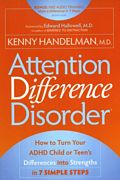
|
Attention Difference
Disorder: How to Turn Your Child or Teen’s Differences into
Strengths in 7 Simple Steps. Kenny Handelman, $25.50
In Attention Difference Disorder, Dr. Handelman combines his clinical and scientific background with a positive, strength based approach to bring you 7 simple steps to succeed with ADD.
Dr. Handelman shares that there is not always a deficit in attention with ADD, rather there are differences. In this concise, easy to read and thorough book, you'll begin to see ADD in a completely different light. The science is combined with a practical and easy to implement approach, where the 7 steps help parents navigate the different treatments needed to help their children succeed. The 7 steps include strategies for home, school, medications as well as a thorough review of alternative treatments for ADD.
Attention Difference Disorder helps parents to understand their "Parent's ADD Journey", and provides a plan to help you to unwrap the gifts in your child’s ADD. |
Back to top
|
|
The Boy from Hell: Life with a Child with ADHD. Alison
Thompson, $18.95
For Alison, life with her son Daniel sometimes seemed
like an endless round of difficulties: disobedience, backchat, rudeness,
name-calling and aggression. Upon starting school, where his aggression and
lack of concentration concerned teachers, Daniel was given a vague diagnosis of
borderline Attention Deficit Hyperactivity Disorder (ADHD), which was later
changed to ADHD with secondary Oppositional Defiant Disorder and autistic
traits.
In this honest account of the first 18 years of Daniel's life, Alison
exposes her own worries, doubts, and exceptional courage at every pivotal turn
in Daniel's life. Interspersing the narrative with tips and advice on what she
has found useful — or not — in bringing up Daniel, Alison also provides
encouraging guidance for teachers and fellow parents. This book also raises
serious questions about how the education system supports children with special
needs, and if medication can be the answer to managing ADHD in children. |
|
|
The Conscious Parent's Guide to ADHD: a Mindful
Approach for Helping Your Child Gain Focus and Self-Control. Rebecca
Branstetter, $16.99
With The Conscious Parent's Guide to ADHD, you
will learn how to take a relationship-centered approach to parenting that
engages your child and ensures that he succeeds behaviorally, socially, and
cognitively. Conscious parenting is about being present with your child and
taking the time to understand how to help him flourish. By practicing this
mindful method, you can support your child emotionally and help nurture his
development.
With this all-in-one guide, you can create a plan that
not only addresses the challenges a child with ADHD faces, but also creates a
mindful, less stressful atmosphere for the whole family. |
|
Different Minds: Gifted
Children with AD/HD, Asperger Syndrome and Other Learning Deficits.
Deirdre Lovecky, $32.95
Through recognizing, explaining and exploring the different levels
and kinds of giftedness, this book provides an insight into the challenges
and benefits specific to gifted children with attention difficulties.
Lovecky advises how best to nurture individual needs, positive
behavior and relationships at home and at school. |
Back to top
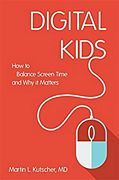
|
Digital Kids: How to Balance Screen Time, and Why it
Matters. Martin Kutscher, $19.95
For many children and teens daily Internet use is the
norm — but where should we draw the line when it comes to digital media usage?
This handy book lays out the essential information needed to understand and
prevent excessive Internet use that negatively impacts behaviour, education,
family life, and even physical health.
Martin Kutscher, MD analyses neurological, psychological
and educational research and draws on his own experience to show when Internet
use stops being a good thing and starts to become excessive. He shows how to
spot digital addictions, and offers whole family approaches for limiting the
harmful effects of too much screen time, such as helping kids to learn to
control their own Internet use. He tackles diverse questions ranging from the
effects of laptops in the classroom and reading on a digital screen, to whether
violent videogames lead to aggression. The author also explains how ADHD and
Autism Spectrum Disorder (ASD) can make you more susceptible to Internet
addiction, suggesting practical strategies to suit these specific needs.
Discussing both the good and bad aspects of the internet, this book tells you
everything you need to know to help children and young people use the internet
in a healthy, balanced way. |
|
Disconnected Kids: the Groundbreaking Brain Balance Program for Children with Autism, ADHD, Dyslexia and Other Neurological Disorders, Revised and Updated Edition. Robert Melillo, $18.95
Dr. Robert Melillo brings a new understanding to
the cause of autism, Asperger's syndrome, ADHD, dyslexia, and obsessive
compulsive disorder with his revolutionary program. It has achieved
fully documented results that have dramatically improved the quality
of life for children and their families in every aspect: behavioral,
emotional, academic, and social. Disconnected Kids shows parents
how to use this drug-free approach at home, including:
- Fully customizable exercises that target physical, sensory and academic performance
- A behavior modification plan
- Advice for identifying food sensitivities that play a hidden role
- A follow-up program that helps to ensure lasting results
|
|
A Disease Called Childhood: Why ADHD Became an
American Epidemic. Marilyn Wedge, $21.00
In 1987, only 3 percent of American children were
diagnosed with attention-deficit/hyperactivity disorder, also known as ADHD. By
2000, that number jumped to 7 percent, and in 2014 the number rose to an
alarming 11 percent. To combat the disorder, two thirds of these children, some
as young as three years old, are prescribed powerful stimulant drugs like
Ritalin and Adderall to help them cope with symptoms. Meanwhile, ADHD rates
have remained relatively low in other countries such as France, Finland, and the
United Kingdom, and Japan, where the number of children diagnosed with and
medicated for ADHD is a measly 1 percent or less.
Alarmed by this trend, family therapist Marilyn Wedge set out to understand how
ADHD became an American epidemic. If ADHD were a true biological disorder of
the brain, why was the rate of diagnosis so much higher in America than it was
abroad? Was a child's inattention or hyperactivity indicative of a genetic
defect, or was it merely the expression of normal behavior or a reaction to
stress? Most important, were there alternative treatments that could help
children thrive without resorting to powerful prescription drugs? In an effort
to answer these questions, Wedge published an article in Psychology Today entitled "Why French Kids Don't Have ADHD" in which she argued that
different approaches to therapy, parenting, diet, and education may explain why
rates of ADHD are so much lower in other countries.
In A Disease Called Childhood, Wedge examines how myriad factors have
come together, resulting in a generation addicted to stimulant drugs, and a
medical system that encourages diagnosis instead of seeking other solutions.
Writing with empathy and dogged determination to help parents and children
struggling with an ADHD diagnosis, Wedge draws on her decades of experience, as
well as up-to-date research, to offer a new perspective on ADHD. Instead of
focusing only on treating symptoms, she looks at the various potential causes
of hyperactivity and inattention in children and examines behavioral and
environmental, as opposed to strictly biological, treatments that have been
proven to help. In the process, Wedge offers parents, teachers, doctors, and
therapists a new paradigm for child mental health — and a better, happier, and
less medicated future for American children |
Back to top
|
Disorganized
Children: a Guide for Parents and Professionals. Edited
by Samuel Stein & Uttom Chowdhury, $39.95
Disorganized children may display a range of behaviours
symptomatic of, for example, ADHD, autism and conduct disorders,
but they often fail to meet all the criteria for a clear diagnosis.
In this book, psychiatrists, speech, family and occupational therapists
and neurodevelopment specialists present a range of behavioural
and psychological strategies to help disorganized children improve
concentration and performance in the classroom and deal with a variety
of behaviour and social interaction difficulties. The combination
of information, exercises and case studies makes this a valuable
tool for use by parents, health care and teaching professionals,
and the authors provide an insight into the mind of disorganized
children and practical guidance on how best to help them achieve
their full potential. |
|
|
8 Keys to Parenting Children with ADHD. Cindy
Goldrich, $25.95
Parenting children with ADHD, whether diagnosed or
undiagnosed, can be challenging and complex. But just as a child who struggles
with reading can learn to decode words, children with ADHD can learn patience,
communication, and solution-seeking skills to become more confident,
independent, and capable. This book, rich with optimism, tips, tools, and
action plans, offers science-based insights and systems for parents to help
cultivate these skills.
Following the parenting principle to “Parent the
child you have,” Goldrich offers advice to help readers tailor their
parenting to meet the needs of their unique child. The book also leads parents
to recognize the value of being a leader and a guide to children, building
parents’ confidence in their decision-making, and giving children a sense of
safety, security, and confidence.
The principles outlined in 8 Keys to Parenting
Children with ADHD are appropriate for parenting kids of all ages—until
they have “launched” and are on their own. |
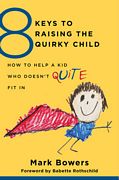
|
8 Keys to Raising the Quirky Child: How to Help a Kid
Who Doesn't Quite Fit In. Mark Bowers, $22.95
A quirky child experiences difficulty fitting in and
connecting with others usually due to an interpersonal style or behavior that
stands out from the other kids. Maybe they are obsessed with a topic of
interest or spend excessive hours a day reading, playing video games, or
playing with just one toy. These kids are not so far afield as to fall on the
autism spectrum, but they are unique, and their behaviors are not addressed in
typical parenting books.
This book defines quirky markers and offers strategies
for parents to understand their children’s brains and behaviors; to know what
is developmentally appropriate, and what isn’t; to understand how to reach
their kids; and to help facilitate their social functioning in the world. It
will calm the hearts and minds of parents who worry that their child doesn’t
fit in and offer hope to parents who need strategies to support their quirky
child’s overall development. |
Back to top
|
The Energetic Brain:
Understanding and Managing ADHD. Cecil Reynolds, Kimberley Vannest
& Judith Harrison, $27.95
Accessible,
reassuring and grounded in scientific research, The Energetic Brain offers
parents, teachers, and adults with ADHD proven skills to solve learning and
social problems and to promote success in all aspects of life. |
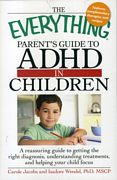
|
The Everything Parent’s Guide to ADHD in Children. Carole Jacobs & Isadore Wendel, $17.99
A practical and reassuring guide to getting the right diagnosis, understanding treatments and helping your child. |
|
The Family ADHD Solution. Mark Bertin, $23.00
A scientific approach to maximizing your child’s attention and minimizing parental stress. |
Back to top
|
Finally Focused: the Breakthrough Natural Treatment
Plan for ADHD. James Greenblatt & Bill Gottlieb, $23.00
Dr. James Greenblatt has seen thousands of children and
adults struggling with the symptoms of ADHD – hyperactivity, inattentiveness,
impulsiveness, and often irritability and combativeness. Rather than simply
prescribing medication for their ADHD symptoms, he tailors remedies to his
patients’ individual needs, detecting and treating the underlying causes of the
disorder.
Finally Focused provides proven natural and
medical methods to easily treat problems such as nutritional deficiencies or
excesses, dysbiosis (a microbial imbalance inside the body), sleeping
difficulties, and food allergies, all of which surprisingly can cause or worsen
the symptoms of ADHD. Using Dr. Greenblatt’s effective Plus-Minus Healing Plan,
parents will first understand the reasons behind their child's symptoms, and
then be able to eliminate them by addressing the child’s unique pattern of
biological weakness. Adults with ADHD can do the same for themselves. And if
conventional medication is still necessary, this integrative approach will
minimize or even eliminate troublesome side effects. Using Dr. Greenblatt’s
expert advice, millions of children and adults with ADHD finally will get the
help they need to achieve true wellness. |
|
The Gift of
ADHD Activity Book: 101 Ways to Turn Your Child’s Problems into
Strengths. Lara Honos-Webb, $19.95
Based
on the ideas presented in her book The Gift of ADHD, author Lara
Honos-Webb brings parents fun and positive activities to help develop
and reinforce your child’s creativity, sensitivity and passion
for living. |
|
The Gift of ADHD: How to Transform Your Child’s Problems
into Strengths. Lara Honos-Webb, $22.95
As a parent, you already know that your child has many
gifts. What you may not know is that attention-deficit hyperactivity disorder
(ADHD) related symptoms-the very qualities that lead him or her to act out and
distract others-may be among them. This second edition of The Gift of
ADHD includes compelling new research indicating that the impulses that
lead your child to act exuberantly may correspond with unusual levels of
creativity and a heightened capacity for insight into the feelings and emotions
of others. Could it be that ADHD is not a hindrance, but an asset in our
fast-paced digital age?
ADHD expert Lara Honos-Webb presents the evidence for
this revolutionary concept and explains how you can help your child develop
control over inattentive, hyperactive behavior and enhance the five gifts of
ADHD: creativity, attunement to nature, interpersonal intuition, energetic
enthusiasm, and emotional sensitivity. Filled with easy skill-building
activities you and your child can do together, this book will help your child
transform problematic symptoms into strengths, then build the self-esteem they
need to let those gifts shine. |
Back to top
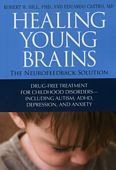
|
Healing
Young Brains — the Neurofeedback Solution: Drug-Free Treatment
for Childhood Disorders, Including Autism, ADHD, Depression, and
Anxiety. Robert Hill &
Eduardo Castro, $22.95
Healing Young Brains is a parent’s guide to
treating their children with neurofeedback as an alternative to
drugs. Neurofeedback is a form of brainwave feedback that can help
train a child's brain to overcome slow brainwave activity and increase
and maintain its speed permanently. Quick, noninvasive and cost
effective, neurofeedback is effective without any of the side effects
associated with drugs commonly used to such childhood disorders
as autism, ADHD, dyslexia, sleep disorders, and emotional problems. |
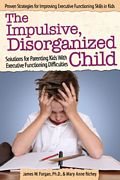
|
The Impulsive, Disorganized Child: Solutions for
Parenting Kids with Executive Functioning Difficulties. James Forgan &
Mary Anne Richey, $24.95
Impulsive, scattered, lost, unfocused, unprepared,
disorganized: These are just a few of the words used to describe kids with
executive functioning deficits, which commonly affect many children already
diagnosed with ADHD, learning disabilities, and autism. The Impulsive,
Disorganized Child: Solutions for Parenting Kids With Executive Functioning
Difficulties helps parents pinpoint weak executive functions in their
children, then learn how to help their kids overcome these deficits with
practical, easy solutions.
Children who can't select, plan, initiate, or sustain
action toward their goals are children who simply struggle to succeed in school
and other aspects of life. Parents need the helpful, proven advice and
interactive surveys and action plans in this book to empower them to take
positive action to teach their disorganized, impulsive child to achieve independence,
success, and a level of self-support. |
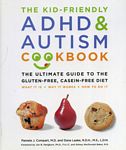
|
The Kid-Friendly
ADHD & Autism Cookbook: the Ultimate Guide to the Gluten-Free,
Casein-Free Diet. Pamela Compart & Dana Laake, $20.99
The best “kid-friendly” recipes and guide
to the gluten-free milk-free diet for ADHD and Autism. What it is.
Why it works. How to do it. |
Back to top
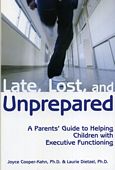
|
Late, Lost, and Unprepared:
a Parents' Guide to Helping Children with Executive Functioning. Joyce Cooper-Kahn & Laurie Dietzel, $29.95
Executive functions are the cognitive skills that help us manage our lives and be successful. Children with weak executive skills, despite their best intentions, often do their homework but forget to turn it in, wait until the last minute to start a project, lose things, or have a room that looks like a dump! The good news is that parents can do a lot to support and train their children to manage these frustrating and stressful weaknesses.
Late, Lost and Unprepared is a must-have book
for parents of children from primary school through high school
who struggle with:
-
Impulse Control (taking turns, interrupting others, running off)
-
Cognitive Flexibility (adapting to new situations, transitions, handling frustrations)
-
Initiation (starting homework, chores, and major projects)
-
Working Memory (following directions, note-taking, reading and retaining info)
-
Planning & Organizing (completing and turning in homework, juggling schedules)
-
Self-monitoring (making careless errors, staying on topic, getting into trouble but not understanding why)
Written by clinical psychologists, LATE,
LOST AND UNPREPARED emphasizes the need for a two-pronged
approach to intervention: 1) helping the child to manage demands
in the short run, and 2) building independent skills for long-term
self-management. Full of encouragement and practical strategies,
the book’s organization makes it easy to grasp concepts quickly
and get started. |
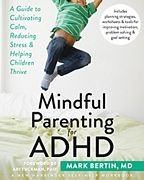
|
Mindful Parenting for ADHD: a Guide to Cultivating
Calm, Reducing Stress & Helping Children Thrive. Mark Bertin, $27.95
If you are a parent of a child with attention deficit/hyperactivity
disorder (ADHD), you probably face many unique daily challenges. Kids with ADHD
are often inattentive, hyperactive, and impulsive, since ADHD affects all of
self-management and self-regulation. As a result, you might become chronically
frustrated or stressed out, which makes caring for ADHD that much harder. In
this book, a developmental pediatrician presents a proven-effective program for
helping both you and your child with ADHD stay cool and collected while
remaining flexible, resilient, and mindful.
Mark Bertin addresses the various symptoms of ADHD using
non-technical language and a user-friendly format. In addition, he offers
guidelines to help you assess your child's strengths and weaknesses, create
plans for building skills and managing specific challenges, lower stress levels
for both yourself and your child, communicate effectively, and cultivate
balance and harmony at home and at school. |
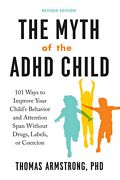
|
The Myth of the ADHD Child: 101 Ways to Improve Your
Child's Behavior and Attention Span Without Drugs, Labels, or Coercion, Revised
Edition. Thomas Armstrong, $23.00
When The Myth of the A.D.D. Child was first
published in 1995, Dr. Thomas Armstrong made the controversial argument that
many behaviors labeled as ADD or ADHD are simply a child's active response to
complex social, emotional, and educational influences. In this fully revised
and updated edition, Dr. Armstrong shows readers how to address the underlying
causes of a child's attention and behavior problems in order to help their
children implement positive changes in their lives.
The rate of ADHD diagnosis has increased sharply, along
with the prescription of medications to treat it. Now needed more than ever,
this book includes fifty-one new non-drug strategies to help children overcome
attention and behavior problems, as well as updates to the original fifty
proven strategies. |
Back to top
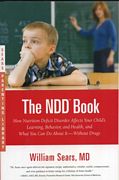
|
The NDD Book. William
Sears, $14.50
How Nutrition Deficit Disorder affects
your child's learning, behavior and health and what you can do about it –
without drugs. |
|
No
Mind Left Behind: Understanding and Fostering Executive Control—The
Eight Essential Brain Skills Every Child Needs to Thrive.
Adam Cox, $17.50
No Mind Left Behind is a program for helping children
master the eight essential cognitive skills that are critical for
success in life in work:
• Taking initiative • Screening out distractions
• Organizing • Thinking flexibly
• Planning • Regulating emotions • Self-monitoring
• Using memory effectively
Using case studies and anecdotes, Dr.
Cox presents a comprehensive and practical plan for parents. The
book addresses special-needs children as well as neurotypical children,
and includes practical suggestions for parents and educators.
|
|
100 Questions &
Answers about Your Child’s ADHD: From Preschool to College, 2nd
Edition. Ruth Nass & Fern Leventhal, $20.95
In this completely revised and updated
edition, Dr. Ruth Nass and Dr. Fern Leventhal provide an authoritative yet
compassionate explanation of the ins and outs of treating this condition and
teaching your child strategies for living and learning with ADHD. Discussing
the medical and psycho-social aspects of the condition, this practical guide
offers parents a helping hand in coping with the demands of raising a child
with ADHD and setting their children on a course for success. |
Back to top
|
1000 Best Tips for ADHD: Expert
Answers and Bright Advice to Help You and Your Child. Susan Ashley, $16.99
When you're struggling to help your
child with homework, chores, or behavior, what you need are quick, easy, and
effective tips you can use right away. Even getting through seemingly easy
tasks can be a relentless challenge that never seems to get easier. As a child
psychologist specializing in ADHD for more than twenty years, Dr. Ashley knows
exactly what parents face every day. 1000 Best Tips for ADHD gives parents
quick tips and easy-to-implement solutions that make even the toughest days go
smoother. |
|
1-2-3 Magic: Effective Discipline for Children 2 – 12,
6th Edition. Thomas Phelan, $22.50; DVD $56.95
This award-winning, bestselling book in a new edition is
now even easier to use with an updated internal design that is user-friendly
and has more visual interest. The 6th Edition is more engaging and browse-able
for the reader. We’ve also added a handy new index. The world's simplest and
most effective parenting program is all right here!
- Part I: Building a Solid Foundation for Parenting
- Part II: Controlling Obnoxious Behavior: Parenting Job 1
- Part III: Managing Testing and Manipulation
- Part IV: Encouraging Good Behavior: Parenting Job 2
- Part V: Strengthening Your Relationship with Your Children:
Parenting Job 3
- Part VI: Enjoying Your New Family Life
|
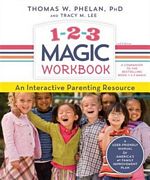
|
1-2-3 Magic Workbook: an Interactive Parenting
Resource, 2nd Edition. Thomas Phelan & Tracy Lewis, $25.50
This user-friendly manual includes chapter reviews, case
studies, self-evaluation questions and planning exercises to help parents get
the most out of the 1-2-3 Magic program. |
Back to top
|
Organize Your
ADD/ADHD Child: a Practical Guide for Parents. Cheryl Carter,
$16.95
Living with ADD/ADHD can be hectic, and parenting a child with this disorder can feel like an uphill struggle when even the simplest of tasks causes havoc. This book addresses the issues of organization and time management in relation to ADD/ADHD, suggesting practical ways of organizing your child's day and turning chaos into calm. Cheryl Carter’s no-nonsense, step-by-step strategies, in combination with positive affirmations and realistic demands, will get ADD/ADHD children organized, and from A to B without a hitch. |
|
Overcoming
ADHD: Helping Your Child Become Calm, Engaged and Focused – Without
a Pill. Stanley Greenspan & Jacob
Greenspan, $31.95
This informative guide applies Stanley Greenspan’s
developmental approach to a very common disorder. In his distinctive
and original view, ADHD is a set of common symptoms that arise from
several different sensory, motor, and self-regulation problems.
Greenspan emphasizes the role of emotion, seeking the root of the
condition and rebuilding the foundations of healthy development.
Overcoming ADHD steers away from the pitfalls of labeling, or of
simply stamping out symptoms with medication, and demonstrates Greenspan’s
abiding belief in the growth and individual potential of each child. |
|
Parenting Children With ADHD: 10 Lessons That Medicine
Cannot Teach, 2nd Edition. Vincent Monastra, $21.95
In this second edition of Parenting Children With
ADHD, Dr. Vince Monastra provides practical, step-by-step guidance to
parents looking for ways to bring out the best in kids with ADHD. He presents
updated lessons about the causes of ADHD, how medications work, and the
problems that sleep deficits, poor nutrition, and other medical disorders can
cause. He also shares his innovative approach for improving organization,
task-completion, problem-solving and emotional control. Updates in this edition
include:
- new procedures and tests for diagnosing ADHD
- empirically-supported psychological treatments for ADHD,
including neurotherapy
- tips for developing a safe, supportive educational environment
for your child
- a new chapter on teaching life values such as kindness,
generosity and compassion
|
Back to top
|
Parenting Your Child with ADHD: a
No-Nonsense Guide for Nurturing Self-Reliance and Cooperation. Craig Wiener, $24.95
Parenting Your Child with
ADHD presents a groundbreaking program for parents seeking to reduce their
child’s inattention, hyperactivity, and impulsivity and strengthen his or her
capacity for self-reliance and cooperation. This unique program promotes
positive ways of interrelating and shows parents the five main ways they may
have unwittingly reinforced ADHD symptoms in the past. Far from encouraging
parents to strictly manage ADHD children, this approach promotes independence
in kids so that less discipline and surveillance is necessary.
Specifically, this book helps parents promote cooperation by phrasing their requests
in specific ways, reducing pressure on their child, and acknowledging the
child’s preference as a way to make cooperation a more attractive choice to him
or her. Parents learn to resolve problems related to messiness, inappropriate
silliness and intrusiveness, chores and helping family members, coordinating
schedules, sneaking and stealing, noise and yelling, and overreacting. The
second part of the book moves on to issues that take place outside the home,
such as shopping excursions, family outings, and travel. Finally, parents learn
ways to increase their child’s independence and cooperation with schoolwork and
compliance in the classroom environment. The child learns the value of being
knowledgeable without the motivation of punishment or gift rewards. |
|
Raising Boys with ADHD: Secrets for
Parenting Healthy, Happy Sons. James Forgan &
Mary Anne Richey, $19.95
Written by two professionals who have
"been there and done that" with their own sons, Raising Boys with ADHD empowers parents to help their sons with ADHD find success in
school and beyond. The book covers topics not often found in other parenting
guides such as the preschool years and early diagnosis, and strategies for
teens transitioning to work and college. Filled with practical knowledge,
resources, and tools needed to help parents address the many strengths and
challenges of boys with ADHD, this book provides parents with encouragement and
hope for the future. |
|
Raising Girls With ADHD: Secrets for Parenting
Healthy, Happy Daughters. James Forgan & Mary Anne Richey, $19.95
Raising Girls with ADHD provides expert information
to empower parents to make decisions about identification, treatment options,
behavioral strategies, personal/social adjustment, educational impact, and many
other issues from preschool through high school. These girls' struggles with
socialization and peer acceptance, executive functioning skills like memory and
organization, and emotional well-being and self-confidence are discussed with a
goal of maximizing strengths and providing supports for weaknesses. Complete
self-reflection surveys and action steps for parents and girls alike are
included to create a dynamic action plan for your daughter's success in school
and beyond. |
Back to top
|
Ready for Take-Off: Preparing Your Teen with ADHD or LD for College. Theresa Maitland & Patricia Quinn, $23.95
Using college readiness surveys and handy worksheets,
Ready for Take-Off helps parents promote self-determination, academic
and daily living skills in your teen — skills needed to succeed
in college and life beyond high school. |
|
Remembering Ritalin: a Doctor and
Generation Rx Reflect on Life and Psychiatric Drugs. Lawrence Diller, $17.00
How are the
kids of Generation Rx doing now? This groundbreaking book reveals the
answers — and raises some important new questions.
Written by a clinician with more than thirty
years of experience with child patients, Remembering Ritalin offers an intimate
and revealing look at the ADHD generation — how they’re doing now and the
long-term effects of their diagnoses, medication, and treatment. Revisiting
former patients who are now in their twenties, Dr. Diller takes a fresh look at
the issue of treating our kids. Together with his articulate former patients, Remembering Ritalin provides insights into one of the most controversial treatment methods
of our time. |
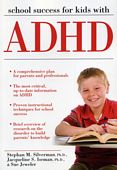
|
School Success for Kids with ADHD.
Stephan Silverman, Jacqueline Iseman & Sue Jeweler, $19.95
With the growing number of children diagnosed with
attention problems, parents and teachers need practical advice for
helping these children succeed in school. School Success for Kids with ADHD looks at the causes and types of attention deficits and
how they appear in the school context. Readers learn to advocate
for these students in the school environment, and how to coach students
with attention deficits to success. The authors also include a brief
overview of research and medical perspectives on attention deficits,
strategies used by teachers of children with ADHD, and helpful tools
for parents and teachers to employ. |
Back to top
|
Self-Reg: How to Help Your Child (and You) Break the
Stress Cycle and Successfully Engage with Life. Stuart Shanker, with Teresa
Barker, $20.00 
There is no such thing as a bad kid. According to
world-renowned psychologist Stuart Shanker, even the most frustrating, annoying
or troubling behaviour has an explanation. That means there is a way to make
things better.
Shanker's research has shown that for every child and
every adult the ability to thrive — to complete tasks, form friendships, learn,
and even love — depends on being able to self-regulate. In the past twenty
years neurobiological research has been showing us a lot about brain states,
and what is clear now is that the ability to self-regulate in response to
stress is central. There are dramatic consequences to looking at a child's
behaviour through the lens of self-regulation. Above all it discards the
knee-jerk reaction that a child who is having trouble paying attention,
controlling his impulses, or who gives up easily on a difficult task, is
somehow weak or lacks self-discipline, or is not making a great enough effort
to apply himself.
According to Shanker, the ability to deal effectively
with stress is limited, though. Like a tank of gas, our energy reserves
eventually dwindle, leaving a kid — or an adult — simply unable to control his
or her impulses. And what draws down our reserves? Excessive stress. Stress of
all kinds, from social anxiety to an uncomfortable chair. Reduce the stress
loads, and problems quickly dissipate. Dr. Shanker offers practical,
prescriptive advice for parents — giving them concrete ways to develop their
own self-regulation skills and teach their children to do the same. |
|
Special Needs Kids Go Pharm-Free. Judy Converse, $20.00
At last — nutrition strategies designed to lessen dependence on prescription medications and to help your child thrive. The book’s nutrition-focused tools help minimize meds and maximize health and well-being. Covers autism, asthma, ADHD, allergies, mood disorders and learning problems. |
Back to top
|
Step by Step Help for
Children with ADHD: a Self Help Manual for Parents. Cathy
Laver-Bradbury, et al, $18.95
Raising a child with ADHD can be distressing and exhausting for the whole family. But given the appropriate knowledge, and the right tools, parents can intervene to manage their child's behaviour, leading to improved relationships at home and, it is hoped, a more successful time at school.
Based on research and extensive clinical experience,
Step by Step Help for Children with ADHD will help families to adapt
their parenting to the child, improving relationships and behaviours
in the home and at play group. |
|
Straight Talk about Psychiatric Medications for Kids, 4th
Edition. Timothy Wilens & Paul Hammerness, $24.50
Is medication the right choice for treating your child's
emotional or behavioral problems? How can you be confident that he or she has
been properly diagnosed? What do you need to know to get the most benefits from
medication treatment, with the least risk? From leading child psychiatrists
Timothy Wilens and Paul Hammerness, this book has already empowered many tens
of thousands of parents to make tough decisions and become active, informed
managers of their children's care. With clarity and compassion, it explains how
medications work; their impact on kids' emotions, personality, school
performance, and health; the pros and cons of specific treatment options; and
much more. In addition to parents, teachers and other school professionals will
find this book an ideal reference. |
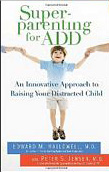
|
Super-Parenting for ADD: an Innovative Approach to Raising Your Distracted Child.Edward Hallowell & Peter Jensen, $18.95
Drs. Hallowell and Jensen fully understand the real
and everyday challenges — both at home and at school —
facing parents of an ADD child. Super-Parenting for ADD shows you
how to unwrap the wonderful, surprising gifts of ADD and turn what
is too often labeled a lifelong disability into lifelong strengths. |
Back to top
|
|
Taking Charge of ADHD: the Complete,
Authoritative Guide for Parents, 3rd Edition. Russell Barkley, $27.95
This treasured parent resource gives you
the science-based information you need about attention-deficit/hyperactivity
disorder (ADHD) and its treatment. It also presents a proven eight-step
behavior management plan specifically designed for 6- to 18-year-olds with
ADHD. Updated throughout with current research and resources, the third edition
includes the latest facts about medications and about what causes (and doesn't
cause) ADHD. Offering encouragement, guidance, and loads of practical tips
and tools, Dr. Barkley helps you:
- Make sense of your child's symptoms
- Get an accurate diagnosis
- Work with school and health care professionals
to get needed support
- Learn parenting techniques that promote better
behavior
- Strengthen your child's academic and social
skills
- Use rewards and incentives effectively
- Restore harmony at home
|
|
Teaching Life Skills to Children and Teens with ADHD:
a Guide for Parents and Counselors. Vincent Monastra, $23.50
When children have attention deficit/hyperactivity
disorder (ADHD), even if their medication smoothes out the worst of the bumps,
they still may have a lot of trouble in social situations. Teaching Life
Skills to Children and Teens With ADHD describes the Life Skills
Program created by author Vincent Monastra at his ADHD clinic. It features
practical strategies for helping children and teens develop essential life
skills at home, school, or in a support group setting. Some of these skills
include:
- Engaging others in conversations
- Seeking out confidence-building experiences
- Responding appropriately to teasing
- Establishing friendships and social networks
- Trying group activities to avoid isolation
- Developing healthy eating, sleeping and exercise habits
- Solving problems and getting organized
- Showing sensitivity to others' emotions
Each chapter includes exercises to help you teach, model,
and guide your child in trying out these skills. Interactive checklists,
quizzes, and guided journal entries are provided as tools for reflection and
for engaging children and teens in ways that are interesting and fun. |
Back to top
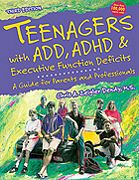
|
Teenagers with ADD, ADHD & Executive Function
Deficits: a Guide for Parents and Professionals, 3rd Edition. Chris Zeigler
Dendy, $36.50
Teenagers with ADD, ADHD & Executive Function
Deficits is the one-stop source of up-to-date, scientifically accurate, and
reassuring information written by parent, teacher, school psychologist, mental
health counselor, and advocate Chris Dendy. Her book looks at key
areas — academics, dating, driving, socializing, and greater independence — that
make adolescence potentially more difficult for kids with ADD, ADHD, or
Executive Function Deficits (EFD).
Teenagers with ADD, ADHD & Executive Function
Deficits gives parents guidance on everything from understanding the diagnosis
to treatment options, and from behavioral and academic issues, to parent involvement
and self-advocacy. The new edition includes new and expanded information on:
- latest diagnostic criteria in the DSM-5
- new research on attention deficits and executive function
deficits and treatment options; the link between ADHD and EFD
- new medications and research on treatment effectiveness
- “concentration deficit disorder” or “slow cognitive tempo,” a new
diagnosis that some experts are advocating for to describe a subset of kids
with inattentive ADHD (low energy, daydreaming, slow processing of info)
- using technology (apps, smartphones, tablets) to help teens
compensate for ADHD-related difficulties
- “flipped classrooms” (teachers send videos of
lectures/explanations of concepts home for kids to watch for homework and then
have kids do written work in class so they can provide feedback as they work)
- updates on educational laws/regulations that affect students with
ADHD
The author recommends a combination approach to treatment
which includes using medications, behavior and academic interventions and
accommodations, ADHD education, and exercise. In addition, she discusses the
role of executive function problems and how they relate to teenagers'
difficulties with organizational skills, long-range planning, and staying on
task. Throughout, are the voices of teens, families, and professionals who
share their experiences and insights. Armed with the book’s comprehensive facts
and strategies, parents, educators, and therapists can be proactive, working
together with teens to build resilience and a hopeful future. |
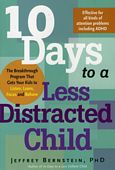
|
10 Days to a Less
Distracted Child. Jeffrey Bernstein, $18.50
A fresh and practical take on handling inattentive/hyperactive children. Anecdotal examples throughout help parents understand their kids, improve focus and organization at school, and eliminate other distracted or inappropriate behaviors at home. Effective for all kinds of attention problems, this original approach to inattentive children will help parents overcome the daily battles and help build your child’s confidence, skills and self-esteem. |
Back to top
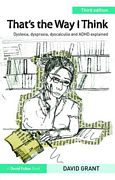
|
That's The Way I Think: Dyslexia, Dyspraxia, ADHD and
Dyscalculia Explained, 3rd Edition. David Grant, $50.30
About 1 in 20 individuals are dyslexic. This figure also
applies for dyspraxia and ADHD. This fully revised edition of David Grant’s thought-provoking,
insightful book develops our understanding of these specific learning
differences and considers the further challenges presented by these overlapping
conditions.
This new edition includes a brand-new chapter on
dyscalculia. New sections also explore updates in the study of dyslexia,
dyspraxia and ADHD as well as visualisation and synaesthesia, in the light of
new data and research. These updates enable the reader to gain a fuller
understanding of the sensory experiences and thoughts of individuals with
specific learning differences.
The author takes a life-style approach to explain many of
the everyday experiences and choices of individuals with specific learning
differences, including sleep, sports, visualisation and creativity, and uses
real life examples explained in the words of those with specific learning
differences.
The accessible style of this book will immediately strike
a chord with anyone with first or second-hand experience of specific learning
differences. It is invaluable and insightful reading for those with specific
learning differences as well as their parents and/or partner, teachers,
teaching assistants and SENCos. |

|
To Be Gifted and Learning Disabled: Strength-Based
Strategies for Helping Twice-Exceptional Students with LD, ADHD, ASD, and More,
3rd Edition. Susan Baum, Robin Schader & Steven Owen, $49.95
To Be Gifted and Learning Disabled is one of the
most popular resources available on identifying and meeting the needs of
twice-exceptional students. This updated third edition provides a comprehensive
look at the complex world of students with remarkable gifts, talents, and
interests, who simultaneously face learning, attention, or social challenges
from LD, ADHD, ASD, and other disorders. Through case studies and years of
research, the authors present a rationale for using a strength-based,
talent-focused approach to meeting the needs of this special population. From a
thorough description of twice-exceptionality and the unique learning patterns
of these students, to strategies for identification, comprehensive programming,
talent development, and instructional strategies, this book explores the
distinguishing strengths (yellows) and complex challenges (blues) that these
students face. In painting, green is a mix of yellows and blues. Because of
their individual characteristics, twice-exceptional students come in a
remarkable range of greens. |
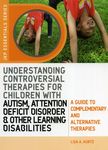
|
Understanding
Controversial Therapies for Children with Autism, Attention Deficit
Disorder, and Other Learning Disabilities: a Guide to Complementary
and Alternative Medicine. Lisa Kurtz, $19.95
Understanding Controversial Therapies covers a wide
variety of mind-body interventions and manipulative techniques,
as well as energy therapies, biologically based methods, and alternative
medical systems. For each approach, the author provides a detailed
description of what the treatment involves, which professionals
will be working with the child, and an explanation of the rationale
behind the therapy. She also offers advice on who to approach for
treatment, and includes a list of recommended resources and useful
contacts for further information. |
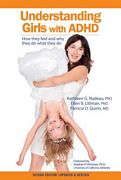
|
Understanding Girls with ADHD: How They Feel and Why
They Do What They Do, 2nd Edition. Kathleen Nadeau, Ellen Littman &
Patricia Quinn, $28.95
A practical, solution-focused book, Understanding
Girls with ADHD offers sound advice for accurate diagnosis, and for working
with girls from preschool through high school. The book also looks at the
research on co-existing conditions such as mood disorders, eating disorders,
and other at-risk behaviors, and addresses ways to address these risks. |
Back to top
Complete
Booklist
ADD Book: New Understandings, New
Approaches to Parenting Your Child. William Sears& Linda Thompson, $22.99
The ADD/ADHD Checklist: a Practical
Reference for Parents and Teachers, 2nd Edition. Sandra Rief, $19.99
ADD/ADHD Drug Free: Natural Alternatives
and Practical Exercises to Help Your Child Focus. Frank Jacobelli & L.A.
Watson, $18.95
The ADHD and Autism Nutritional Supplement Handbook. Dana
Goodbout Laake & Pamela Compart, $24.99
ADHD: Living Without Brakes. Martin
Kutscher, $22.95
AD/HD Parenting Handbook: Practical Advice
for Parents from Parents. C. Alexander-Roberts, $20.95
ADHD and Teens: a Parent's Guide to Making
It through the Tough Years. C. Alexander-Roberts, $16.95
ADHD: What Every Parent Needs to Know, 2nd
Edition. Michael Reiff, $18.95
The Adolescent and Adult Neuro-diversity
Handbook: Asperger Syndrome, ADHD, Dyslexia, Dyspraxia and Related Conditions.
Sarah Hendrickx, $24.95
All About ADHD: a Family Resource for Helping Your
Child Succeed with ADHD, 3rd Edition. Thomas Phelan, $22.50
All About Attention Deficit Disorder DVD;
Part I Symptoms, Development, Prognosis and Causes; Part II Diagnosis and
Treatment. Thomas Phelan, $47.95 DVD format
Attention Deficit Disorder: Natural
Alternatives to Drug Therapy. Nancy Morse, $18.99
Attention Difference Disorder: How to Turn
Your Child or Teen’s Differences into Strengths in 7 Simple Steps. Kenny
Handelman, $25.50
Attention Games: 101 Fun, Easy Games That
Help Kids Learn To Focus. Barbara Sher, $19.00
The Autism & ADHD Diet. Barrie
Silberberg, $16.99
The Boy from Hell: Life with a Child with ADHD. Alison
Thompson, $18.95
The Conscious Parent's Guide to ADHD: a Mindful
Approach for Helping Your Child Gain Focus and Self-Control. Rebecca
Branstetter, $16.99
Back to top Different Minds: Gifted Children with
AD/HD, Asperger Syndrome and Other Learning Deficits. Deirdre Lovecky, $32.95
Digital Kids: How to Balance Screen Time, and Why it
Matters. Martin Kutscher, $19.95
Disconnected Kids: the Groundbreaking Brain
Balance Program for Children with Autism, ADHD, Dyslexia and Other Neurological
Disorders, Revised and Updated Edition. Robert Melillo, $18.95
A Disease Called Childhood: Why ADHD Became an
American Epidemic. Marilyn Wedge, $21.00
Disorganized Children: a Guide for Parents and Professionals.
Edited by Samuel Stein& Uttom Chowdhury, $39.95
8 Keys to Parenting Children with ADHD. Cindy
Goldrich, $25.95
8 Keys to Raising the Quirky Child: How to Help a Kid
Who Doesn't Quite Fit In. Mark Bowers, $22.95
The Energetic Brain: Understanding and Managing ADHD. Cecil
Reynolds, Kimberley Vannest & Judith Harrison, $27.95
The Everything Parent’s Guide to ADHD in
Children. Carole Jacobs & Isadore Wendel, $17.99
The Explosive Child: a New Approach for Understanding and Parenting
Easily Frustrated, ‘Chronically Inflexible’ Children. Ross Greene, $19.99
The Family ADHD Solution. Mark Bertin,
$23.00
Finally Focused: the Breakthrough Natural Treatment
Plan for ADHD. James Greenblatt & Bill Gottlieb, $23.00
The Gift of ADHD Activity Book: 101 Ways to
Turn Your Child s Problems into Strengths. Lara Honos-Webb, $19.95
The Gift of ADHD: How to Transform Your Child’s Problems
into Strengths. Lara Honos-Webb, $22.95
Healing Young Brains — the Neurofeedback
Solution: Drug-Free Treatment for Childhood Disorders, Including Autism, ADHD,
Depression, and Anxiety. Robert Hill & Eduardo Castro, $22.95
Helping Kids and Teens with ADHD in School.
Joanne Steer & Kate Horstmann, $34.95
The Impulsive, Disorganized Child: Solutions for
Parenting Kids with Executive Functioning Difficulties. James Forgan &
Mary Anne Richey, $24.95
The Kid-Friendly ADHD & Autism Cookbook: the Ultimate
Guide to the Gluten-Free, Casein-Free Diet. Pamela Compart & Dana
Laake, $20.99
Kids in the Syndrome Mix of ADHD, LD,
Asperger’s, Tourette’s, Bipolar, and More! Martin Kutscher, $24.95
Late, Lost, and Unprepared: a Parents'
Guide to Helping Children with Executive Functioning. Joyce Cooper-Kahn &
Laurie Dietzel, $29.95
Mindful Parenting for ADHD: a Guide to Cultivating
Calm, Reducing Stress & Helping Children Thrive. Mark Bertin, $27.95
The Myth of the ADHD Child: 101 Ways to Improve Your
Child's Behavior and Attention Span Without Drugs, Labels, or Coercion, Revised
Edition. Thomas Armstrong, $23.00
The NDD Book. William Sears, $14.50
No Mind Left Behind: Understanding and
Fostering Executive Control—The Eight Essential Brain Skills Every Child Needs
to Thrive. Adam Cox, $17.50
100 Questions & Answers about Your Child’s ADHD:
From Preschool to College, 2nd Edition. Ruth Nass & Fern Leventhal,
$20.95
1000 Best Tips for ADHD: Expert
Answers and Bright Advice to Help You and Your Child. Susan Ashley, $16.99
1-2-3 Magic: Effective Discipline for Children 2 – 12,
6th Edition. Thomas Phelan, $22.50
1-2-3 Magic: Managing Difficult Behavior in Children 2
- 12 DVD. Thomas Phelan, $56.95
1-2-3 Magic Workbook: an Interactive Parenting
Resource, 2nd Edition. Thomas Phelan & Tracy Lewis, $25.50
Back to top
Organize Your ADD/ADHD Child: a Practical
Guide for Parents. Cheryl Carter, $16.95
The Out-of-Sync Child: Recognizing and
Coping with Sensory Integration Dysfunction. Carol Kranowitz, $17.50
The Out-of-Sync Child Has Fun: Activities
for Kids with Sensory Integration Dysfunction. Carol Kranowitz, $23.00
Overcoming ADHD: Helping Your Child Become
Calm, Engaged and Focused – Without a Pill. Stanley Greenspan & Jacob
Greenspan, $31.95
Parenting Children With ADHD: 10 Lessons That Medicine
Cannot Teach, 2nd Edition. Vincent Monastra, $22.95
Parenting Your Child with ADHD: a
No-Nonsense Guide for Nurturing Self-Reliance and Cooperation. Craig Wiener, $24.95
Raising Boys with ADHD: Secrets for
Parenting Healthy, Happy Sons. James Forgan & Mary Anne Richey, $19.95
Raising Girls With ADHD: Secrets for Parenting
Healthy, Happy Daughters. James Forgan & Mary Anne Richey, $19.95
Ready for Take-Off: Preparing Your Teen
with ADHD or LD for College. Theresa Maitland & Patricia Quinn, $23.95
Remembering Ritalin: a Doctor and
Generation Rx Reflect on Life and Psychiatric Drugs. Lawrence Diller, $17.00
Right-Brained Children in a Left-Brained
World: Unlocking the Potential of Your ADD Child. J. Freed& L. Parsons, $17.00
School Success for Kids with ADHD. Stephan
Silverman, Jacqueline Iseman & Sue Jeweler, $19.95
Self-Reg: How to Help Your Child (and You) Break the
Stress Cycle and Successfully Engage with Life. Stuart Shanker, with Teresa
Barker, $20.00
Special Needs Kids Go Pharm-Free. Judy
Converse, $20.00
Step by Step Help for Children with ADHD: a
Self Help Manual for Parents. Cathy Laver-Bradbury, et al, $18.95
Straight Talk about Psychiatric Medications for Kids, 4th
Edition. Timothy Wilens & Paul Hammerness, $24.50
Super-Parenting for ADD: an Innovative
Approach to Raising Your Distracted Child.Edward Hallowell& Peter Jensen,
$18.95
Taking Charge of ADHD: the Complete,
Authoritative Guide for Parents, 3rd Edition. Russell Barkley, $27.95
Teaching Life Skills to Children and Teens with ADHD:
a Guide for Parents and Counselors. Vincent Monastra, $23.50
Teenagers with ADD, ADHD & Executive Function
Deficits: a Guide for Parents and Professionals, 3rd Edition. Chris Zeigler
Dendy, $36.50
10 Days to a Less Distracted Child. Jeffrey
Bernstein, $18.50
That's The Way I Think: Dyslexia, Dyspraxia, ADHD and
Dyscalculia Explained, 3rd Edition. David Grant, $50.30
To Be Gifted and Learning Disabled: Strength-Based
Strategies for Helping Twice-Exceptional Students with LD, ADHD, ASD, and More,
3rd Edition. Susan Baum, Robin Schader & Steven Owen, $49.95
Understanding Controversial Therapies for
Children with Autism, Attention Deficit Disorder, and Other Learning
Disabilities: a Guide to Complementary and Alternative Medicine. Lisa Kurtz,
$19.95
Understanding Girls with ADHD: How They Feel and Why
They Do What They Do, 2nd Edition. Kathleen Nadeau, Ellen Littman &
Patricia Quinn, $28.95
Back to top
 Didn't
find it...?
Not sure...?
Need a suggestion...?
There are over 10,000 titles listed on our website and more than 35,000 titles in our inventory. If you haven't found what you want on the website — and it's one of our specialties — chances are good that we carry it, or can get it for you. Just let us know what you're looking for.
Call us toll-free 1-800-209-9182
or e-mail
PARENTBOOKS
is pleased to invoice institutions. Please inquire regarding terms and
discounts. Shop in person, by phone, fax, mail or e-mail . VISA, Mastercard
and Interac are welcome. We are open from 10:30 to 6:00 Monday through Friday and from 11:00 to 5:00 on Saturday.
 All prices are in Canadian dollars
and are subject to change without notice. All prices are in Canadian dollars
and are subject to change without notice.

|